When you are towing a trailer, it is important to have the correct equipment in order to do so safely.
One piece of equipment that is often debated is whether or not a weight distribution hitch is necessary.
In this blog post, we will discuss what a weight distribution hitch does, when you might need one, and how to choose the right one for your needs.
Let’s get started!
Do I need a weight distribution hitch?
If you plan on towing more than 5000 pounds then yes, you will need a weight distribution hitch system to make sure everything is properly balanced and secure during transit.
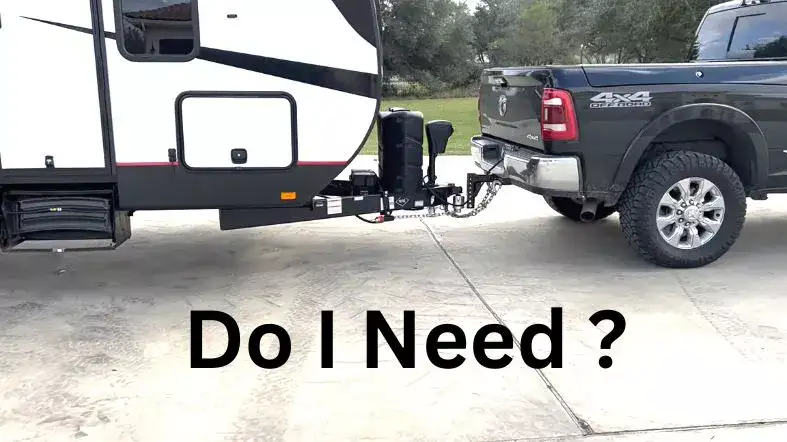
Without one, there is an increased risk of loss of control or jack-knifing due to unevenly distributed tongue weight pulling against your vehicle’s steering wheel or engine power.
It can cause sudden turns or stops as well as poor maneuverability on sharp curves/corners.
Plus, not having a properly loaded trailer can reduce fuel efficiency and increase wear and tear on brakes and tires over time which means costly repairs in the future if left unchecked.
So in short, if you are going to be hauling something heavy – get yourself a good quality weight distribution hitch system!
How does weight distribution hitch work?
A weight distribution hitch works by using spring bars and brackets to distribute the weight of your load across all axles, helping to evenly balance the load that is being towed.
Distribute the weight
Weight distribution hitches are designed to distribute the weight of a trailer more evenly between the tow vehicle and the trailer.
Improve handling and barking
This helps to improve handling and braking, and can also help to prevent Trailer Sway.
Connect to the axle
Weight distribution hitches typically have two or three chains that connect the tow vehicle to the trailer.
The chains are attached to a bar that runs across the width of the trailer.
This bar is connected to the axle of the trailer, and the chains help to distribute the weight of the trailer evenly across the axle.
What Are The Benefits Of Using A Weight Distribution Hitch?
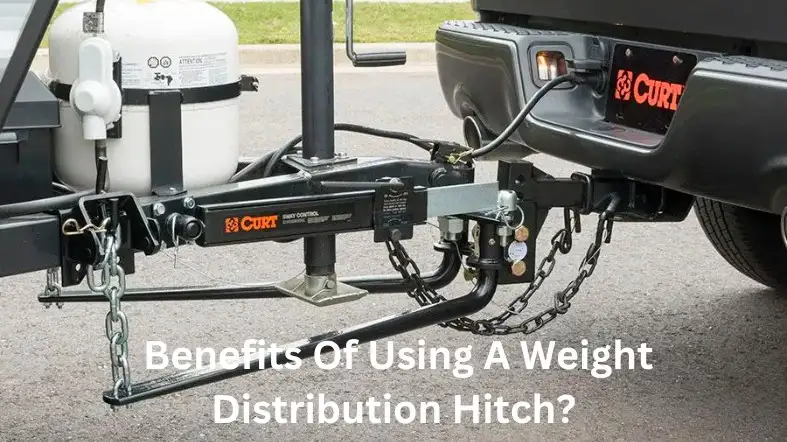
There are a number of benefits to using a weight distribution hitch, including:
Improved Towing Stability
One of the primary benefits of using a weight distribution hitch is that it can help to improve towing stability.
When a trailer is towed, the weight is distributed unevenly between the tow vehicle and the trailer.
This can cause the tow vehicle to become unstable and may even lead to an accident.
By distributing the weight more evenly, a weight distribution hitch can help to improve towing stability and reduce the risk of an accident.
Reduced Trailer Sway
Another benefit of using a weight distribution hitch is that it can help to reduce trailer sway.
Trailer sway occurs when the trailer starts to swing from side to side, which can be dangerous and may even lead to an accident.
Weight distribution hitches help to distribute the weight more evenly, which reduces the risk of trailer sway.
Improved Braking Performance
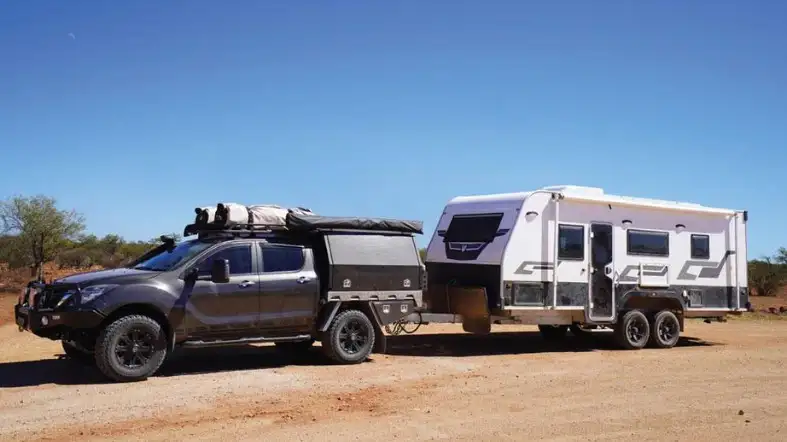
Weight distribution hitches can also help to improve braking performance.
When a trailer is towed, the weight is distributed unevenly between the tow vehicle and the trailer.
This can cause the tow vehicle’s brakes to work harder than they need to, which can lead to reduced braking performance.
By distributing the weight more evenly, a weight distribution hitch can help to improve braking performance.
Increased Towing Capacity
Another benefit of using a weight distribution hitch is that it can help to increase your tow vehicle’s maximum tow capacity.
When the weight is distributed evenly, it puts less strain on your tow vehicle, which allows you to safely tow heavier loads.
Smoother Ride for Both Vehicle and Trailer
Finally, using a weight distribution hitch can also help to provide a smoother ride for both your tow vehicle and your trailer.
When the weight is distributed evenly, there is less stress on your tow vehicle and your trailer, which leads to a smoother ride for both of them.
Overall, there are many benefits to using a weight distribution hitch for your towing needs.
When Should You Consider Using A Weight Distribution Hitch?
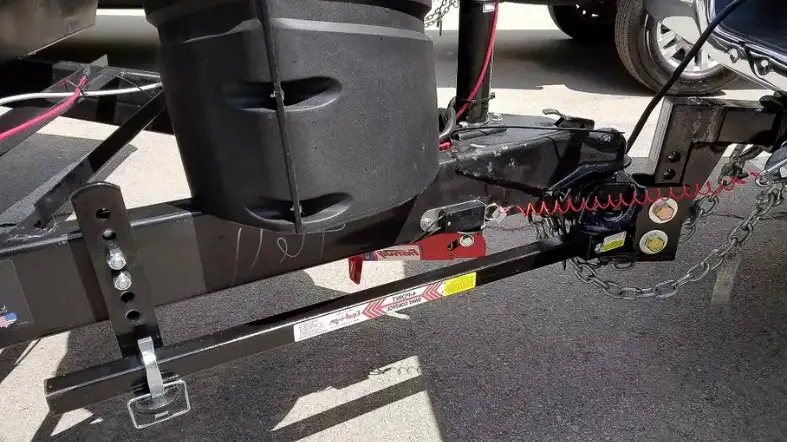
There are a number of situations where using a weight distribution hitch can be beneficial.
It is important to distribute the weight evenly across your vehicle’s suspension system in order to prevent bottoming out or compromising the stability and handling of your vehicle.
When a trailer is heavier in the front
If your trailer is heavier in the front, you will want to use a weight distribution hitch.
This will help to distribute the weight of the trailer more evenly, which will make it easier to tow and will help to prevent any damage to your vehicle.
When a trailer is heavier in the back
If your trailer is heavier in the back, you will want to use a weight distribution hitch.
This will help to distribute the weight of the trailer more evenly, which will make it easier to tow and will help to prevent any damage to your vehicle.
When A Trailer Is Not On Level
If your trailer is not level, you may want to consider using a weight distribution hitch.
This will help to level out the trailer, which will make it easier to tow and will help to prevent any damage to your vehicle.
When having difficulty in steering
If you are having difficulty steering your trailer, you may want to consider using a weight distribution hitch.
This will help to distribute the weight of the trailer more evenly, which will make it easier to tow and will help you to keep control of your vehicle.
When having difficulty stopping
If you are having difficulty stopping your trailer, you may want to consider using a weight distribution hitch.
This will help to distribute the weight of the trailer more evenly, which will make it easier for your brakes to stop the trailer and will help you to avoid any accidents.
How Do You Select The Right Weight Distribution Hitch For Your Vehicle And Load?
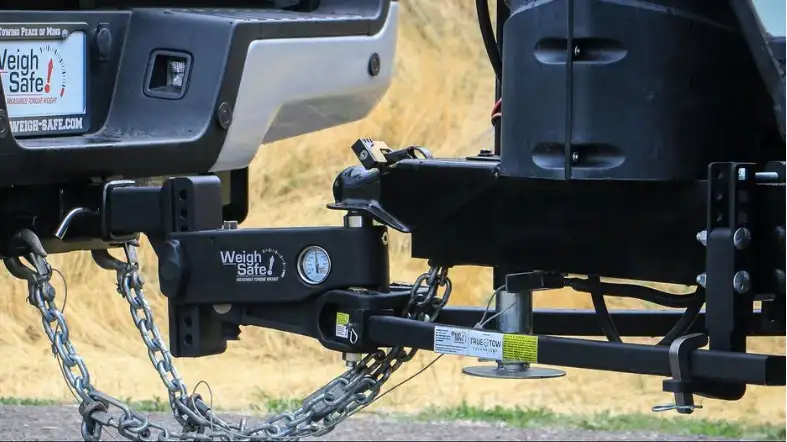
The weight distribution hitch, or WDH for short, is an important component to consider when purchasing a trailer.
It distributes the weight of your load evenly across both axles of your vehicle, reducing the amount of stress placed on just one axle and improving handling.
Consider the Gross Trailer Weight
The first thing you need to do when selecting a weight distribution hitch is to consider the gross trailer weight (GTW).
The GTW is the total weight of your trailer, including all of your belongings, water, and any other items that might be inside.
To determine the GTW of your trailer, simply add up the weights of everything that will be inside.
Consider the Tongue Weight
The second thing you need to consider is the tongue weight (TW).
The TW is the weight of the portion of your trailer that extends out in front of your vehicle.
This is typically 10-15% of the GTW.
To determine the TW of your trailer, simply multiply the GTW by 0.10-0.15.
Select a Hitch Based on Your Vehicle’s Weight Capacity
Once you know the GTW and TW of your trailer, you can then select a hitch based on your vehicle’s weight capacity.
Most vehicles have a maximum towing capacity between 4,000 and 7,000 pounds.
If your vehicle has a towing capacity that is close to or exceeds the GTW of your trailer, then you will need to select a hitch with a higher weight capacity.
Select A Hitch Based On Your Trailer’s Axle Rating
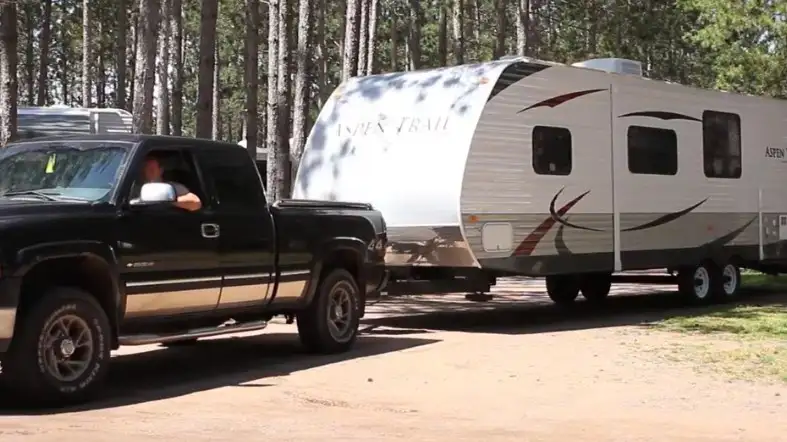
Another important factor to consider when selecting a hitch is the axle rating of your trailer.
The axle rating is the maximum amount of weight that can be safely carried by each axle on your trailer.
To determine the axle rating of your trailer, simply divide the GTW by the number of axles on your trailer.
For example, if your GTW is 7,000 pounds and you have two axles on your trailer, then each axle can safely carry 3,500 pounds.
Consider Your Towing Needs
Finally, you should consider your towing needs when selecting a weight distribution hitch.
For example, if you plan to tow your trailer on long trips or across difficult terrain, then you may want to opt for a more heavy-duty hitch with additional features like sway control or adjustable height.
If you will only be using the trailer locally and don’t need to travel long distances, then a basic weight distribution hitch may be all you need.
FAQs about weight distribution hitch
How Does A Weight Distribution Hitch Work?
A weight distribution hitch relies on a system of spring bars and chains to help evenly distribute the weight across both axles.
The spring bars attach to brackets or brackets that are attached to your vehicle’s frame, while the chains connect the springs with your trailer or towed load.
This helps to keep everything balanced as you drive.
How Do I Know If I Need A Weight Distribution Hitch?
If you are having difficulty stabilizing your tow vehicle or if your trailer is swaying back and forth, you may need a weight distribution hitch.
You can also consult your local dealership or an RV dealer to see if they recommend a weight distribution hitch for your particular situation.
How Much Does A Weight Distribution Hitch Cost?
Weight distribution hitches typically cost between $100 and $200.
You can also expect to pay for installation, which typically costs between $50 and $100.
Final Thought
Whether or not you need a weight distribution hitch depends on the weight and size of your trailer and the type of vehicle you are using to tow it.
If you have a larger or heavier trailer and a smaller vehicle, a weight distribution hitch can help distribute the weight more evenly, providing a safer and smoother towing experience.
However, if you have a smaller or lighter trailer and a larger vehicle, a weight distribution hitch may not be necessary.
Ultimately, it is important to consult with a professional or refer to the manufacturer’s recommendations before making a decision on whether or not to use a weight distribution hitch.
